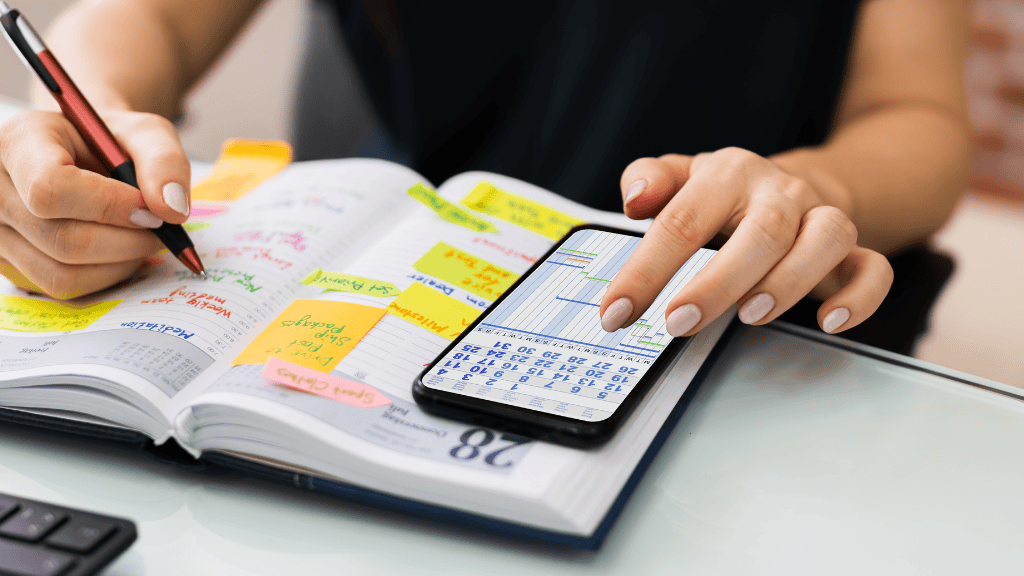
Unlocking Personal Freedom: How to Create and Implement Your ‘No’ List for Enhanced Well-being
This article teaches you to reclaim your time and mental space by setting clear, self-affirming boundaries. Whether declining an unnecessary meeting or stepping away from toxic relationships, each decision to say ‘no’ is a step towards a healthier, more focused, and joy-filled life.
Discover the keys to a well-balanced existence where your well-being takes center stage, fostering peace and fulfillment.
Table of Contents
This post may contain some affiliate links. I only recommend products and services I genuinely believe in. Additionally, some content on this website may have been created with the assistance of AI.

What is a “No” List and Why You Need One
Are you ready to unlock a life of greater joy, reduced anxiety, and improved overall well-being? A “No” list is a powerful self-care tool that can boost your mental health, improve your mood, and create positive ripple effects throughout your daily life.
Our always-on culture glorifies overcommitment. We’re bombarded with constant messages to do more, be more, and please everyone. It’s no wonder so many of us sacrifice our well-being. As a coach who works with my clients on life balance, I constantly witness clients burning the candle at both ends, sacrificing sleep, healthy habits, and their own happiness in the process.
A “No” list isn’t about being selfish or negative. It’s a revolutionary tool of empowerment. It allows you to reclaim ownership of your time, energy, and mental health. By setting healthy boundaries, you create the space needed for a genuinely fulfilling life grounded in self-care.
Key Takeaways
- Discover the power of a “No” list for better self-care.
- Learn essential strategies to protect your time, energy, and mental health.
- Prioritize what matters and break free from limiting patterns.

The Transformative Power of a “No” List
Saying “no” to these 7 things may help protect your energy, foster emotional support, boost your networks, and increase your capacity to prioritize what matters for a healthier, more fulfilling life.
A “No” List: Your Simplified Path to Self-Care
In my years as a wellness and life balance coach, I’ve seen many clients struggle under the weight of an endless “yes.” They juggle overflowing commitments, prioritize everyone else’s needs, and end up feeling utterly depleted because they don’t prioritize their self-care.
Here’s where the magic of a “No” list comes in. It’s not a grumpy rejection tool but a proactive and empowering strategy for self-empowerment. Think of it as a helpful mental filter, helping you navigate requests and commitments with a clear understanding of your own bandwidth.
By creating a “No” list, you’re reserving your precious mental energy and time for the things that nourish, challenge, and energize you. It’s about setting healthy boundaries, reducing decision fatigue, and ultimately paving the way for a more balanced life.

Conserve Your Mental Energy: Stop Decision Overload
Ever feel like your brain is constantly bombarded with choices, big and small? Our days are filled with a million tiny decisions—what to wear, what to eat for lunch, whether to answer that email now or later. It might seem insignificant, but this constant mental back-and-forth depletes our precious mental energy, a phenomenon known as decision fatigue.
Here’s where a “No” list becomes a game-changer for self-care. Think of it as a helpful filter. You free up significant mental space by defining the things you’ll automatically say “no” to, like answering work emails after hours or taking on extra errands. Suddenly, you’re not wrestling with every little decision.
This newfound clarity allows you to focus your energy on what truly matters, whether that’s tackling a creative project, prioritizing quality time with friends and loved ones, or simply enjoying a moment of peace. It’s a simple yet powerful way to cultivate a calmer, more focused mind.

Boundaries = Self-Respect: Learn to Say “No”
Saying “no” can feel tricky. We worry about disappointing others or appearing unhelpful. But here’s the truth: a “No” list is a powerful tool for self-respect.
When you constantly prioritize everyone else, you unintentionally signal that your needs and time aren’t valuable. A “No” list helps you set healthy boundaries, reminding yourself and others that your well-being matters. It’s not about selfishness; it’s about self-worth.
By honoring your limits and saying “no” to things that drain you, you create space to fully engage with the things (and people) that truly matter. It’s how you can give your best to the world with renewed energy levels and a compassionate heart.

Laser-Focus Your Time and Energy
Isn’t it amazing how much we can accomplish when we’re laser-focused? I can personally attest to the energy drain that comes from juggling a million tasks. Remember that overflowing to-do list that leaves you feeling scattered and depleted? A “No” list is like a magic eraser for that feeling.
By eliminating the things that zap your time and energy (think: unnecessary commitments, social media rabbit holes, that extra hour of mindless TV), you create space for what matters most.
The key here is aligning your “no” list with your priorities and goals. What sets your soul on fire? What do you want to achieve in different areas of your life?
Once you know your “yeses,” use your “No” list to clear away the rest ruthlessly. Suddenly, you have the time, energy, and focus to truly invest in the things that make your life vibrant and fulfilling. It’s a simple shift with a powerful impact—from feeling scattered to feeling supercharged and ready to take on the world, one meaningful task at a time.

7 Things to Put on Your “No” List
Saying Yes When You Want to Say No
We’ve all been there: the sinking feeling in your gut when someone asks you to do something, and that familiar “yes, but…” tumbles out before you can even process your true feelings. The truth is, people-pleasing is a recipe for burnout, anxiety and resentment. It whispers that your needs and boundaries don’t matter, leaving you feeling drained and disconnected.
But here’s the magic I’ve witnessed countless times (including in my own life!): saying “no” can be incredibly liberating. It allows you to develop healthier relationships built on authenticity and respect. When you prioritize your well-being and set boundaries, you show yourself and others that your time and energy are valuable.
This newfound self-worth and confidence fosters deeper connections, attracting people who appreciate you for who you indeed are, not just what you can do for them. It’s the first step to creating a life filled with genuine connections and less guilt.

Over Scheduling Yourself
Let’s face it; our calendars can become battlegrounds. We cram in meeting after meeting, social obligations, and that ever-growing to-do list. But here’s what I’ve learned through countless busy days (and the occasional burnout scare!): constantly being “on” is a recipe for disaster.
By overscheduling, you neglect your body’s need for rest. This can lead to fatigue and burnout and affect your ability to focus, impacting your mood and overall mental health.
Our minds and bodies crave periods of downtime, those precious pockets of white space where we can simply just be. During these moments of rest and mindfulness, we recharge, allowing for greater mental clarity, focus, and even creativity. Think of it like this: if you never give your phone a chance to recharge, it eventually dies.
Rest isn’t a luxury; it’s a non-negotiable for optimal performance, health, and happiness. By including “do nothing” time on your to-do list, you’re actively managing stress, preventing burnout, and setting yourself up to tackle life’s challenges with renewed energy and focus. It’s a simple yet powerful shift that can make a world of difference in your overall well-being.

Procrastinating on Self-Care
I see it all the time: we plan workouts we never end up doing, promise ourselves “me-time” that never materializes, and push vital self-care down to the very bottom of our to-do lists. Here’s the truth: self-care isn’t an optional extra to check off when you have time. It’s the very foundation of an enjoyable and well-balanced life.
What is the best way to beat self-care procrastination? Treat it like you would any other important non-negotiable commitment. Schedule those workouts, that nature walk, or some creative time into your calendar.
Just as you wouldn’t dream of canceling an important work meeting at the last minute (well, hopefully!), treat your self-care appointments with the same respect. You’ll reap the health benefits physically and with an improved mood, a greater sense of calm, and a refreshed perspective. It’s truly a gift you give yourself that keeps on giving.

Toxic Relationships
Let’s be honest – no matter how much we care about them, there are people who ultimately leave us feeling drained, undervalued, and questioning ourselves. These are classic signs of toxic relationships, and I’ve learned both personally and through my work that these dynamics damage our self-esteem and mental well-being.
Spending time with people who drain your energy can hurt your self-esteem and mental health. Prioritize friends who support you and offer a listening ear—this has immense health benefits, most notably for your emotional well-being.
Remember, prioritizing your emotional health takes courage. It means surrounding yourself with people who inspire and uplift you, friends who celebrate your wins, and truly listen when you need support. It might involve setting boundaries within or even ending certain relationships. It’s not always easy, but it’s incredibly liberating.
By saying “no” to toxic patterns, you’re essentially saying a resounding “yes” to your own happiness, health, and peace of mind.

Negative Self-Talk
That nagging voice in our heads, the one that whispers doubts, harsh criticisms, and limiting beliefs? I’ve struggled with it, and I see it time and again with clients – it’s a major roadblock to our full potential. The good news is we don’t have to let negative self-talk control our lives.
It starts with a dose of self-compassion. Talk to yourself with the kindness and understanding you’d offer a dear friend. Replace those harsh critiques with positive affirmations that highlight your strengths and potential.
There are powerful tools and strategies to change your inner dialogue, and I’ve seen amazing things happen when people start treating themselves with the same love they offer others. Your confidence grows, your resilience strengthens, and a sense of empowerment begins to infuse your daily life.

Neglecting Your Physical Health
It’s easy to forget how deeply interconnected our minds and bodies are. When I neglect my physical health, I can almost guarantee that my stress levels rise, my mood dips, and my energy plummets. Neglecting sleep, skipping workouts, and relying on quick-fix meals might seem like time-savers, but they eventually catch up with us.
Here’s the good news: prioritize even small shifts in your physical self-care habits, and you’ll reap huge rewards. Start protecting those precious hours of sleep, aim for nourishing meals as often as possible, and get moving in a way that feels good.
It doesn’t have to be gym sessions every day – walks in nature, dancing, or playing with kids all count! Your energy levels will soar, your mood will improve, and you’ll feel more resilient and equipped to handle life’s challenges.
Think of taking care of your body as an investment in your overall health and well-being, an investment that offers some of the highest returns there is.

Comparing Yourself to Others
Let’s be real – it’s so easy to fall into the comparison trap, especially with social media painting a perfectly curated picture of everyone else’s life. I’ve been there and see clients struggle with it daily. The thing is, those comparisons erode our self-worth. Instead of celebrating our unique strengths and journey, we start focusing on what we don’t have.
The truth is that most people only share their highlights online. It’s a curated showreel, not a reflection of their entire reality. Constantly comparing yourself to these snippets leads to feelings of inadequacy and anxiety, and it has an insidious impact on our mental health. So, what’s the antidote?
Focus on your own path, your own growth, and your own unique awesomeness. It takes conscious effort, but by shifting your attention inward, you gradually rewrite the narrative in your head. Remember, there’s only one you, and the world needs the gifts you have to offer!

The “No” List = The Ultimate Yes to Yourself
Throughout this article, we’ve explored how a “No” list is so much more than saying “no.” It’s about honoring your time, needs, and well-being. It’s about creating space for the things that ignite your spirit and bring you true joy. Armed with this simple yet revolutionary tool, you reclaim your power and step into the driver’s seat of your own life.
Remember, Your Well-being Matters
Let’s begin a recap of some of the important lessons we’ve learned:
- A “No” list gives you control over your precious time and resources.
- Setting boundaries is self-respect in action.
- Self-care is a necessity, fostering resilience and joy.
- Your journey is uniquely yours – avoid the comparison trap.

Your Call to Action: Start Your “No” List Today
Don’t wait another day to start prioritizing your well-being. Take a pen and paper, and ask yourself:
- What always leaves me feeling drained and resentful?
- What do I say “yes” to out of guilt or obligation?
- What activities or commitments could I cut back on?
Your answers start to form your very own “No” list!
Remember, It All Starts with “Yes” to Yourself
Saying “yes” to yourself is the most profound act of self-care. When you stop abandoning your needs and dreams, a life of fulfillment, balance, and joy becomes possible. Prioritize yourself, set boundaries, and embrace the power of “no”—this is the key to unlocking your full potential and creating a life you truly love.
This post may contain some affiliate links. I only recommend products and services I genuinely believe in. Additionally, some content on this website may have been created with the assistance of AI.
Frequently Asked Questions
Q: What exactly is a “No” list, and how does it help with self-care?
A: A “No” list is a proactive list of things you choose to say “no” to. This could include commitments, activities, requests, or even negative thought patterns. It streamlines your life, saving time, energy, and mental space for what truly matters to your well-being.
Q: I feel guilty saying “no.” How can I overcome this?
A: Many of us struggle with this! Remember, saying “no” to certain things is actually saying “yes” to yourself. Prioritizing your needs and boundaries shows that you value your time and well-being, which will ultimately lead to deeper, more authentic connections.
Q: My schedule is constantly packed. How can I realistically fit self-care in?
A: Start by viewing self-care as non-negotiable. Schedule it in your calendar like any other appointment – whether it’s exercise, time in nature, or simply quiet time for reflection. Even brief moments of self-care have significant benefits.
Q: How can I distance myself from toxic relationships without hurting the other person?
A: This can be challenging, but remember, your emotional health is a priority. Sometimes, it might mean setting clearer boundaries within the relationship or, in more extreme cases, limiting or ending contact altogether. Focus on finding supportive people who truly lift you up.
Q: How do I stop comparing myself to others, especially on social media?
A: Remember, social media often paints a curated picture. Focus on your own journey, your strengths, and the progress you’re making. Celebrate small wins, and practice self-compassion along the way.
About The Author
Jahlila is a Transformational Whole Self and Wellness Lifestyle Empowerment Coach, a devoted mother, passionate writer, and a fervent advocate for holistic wellness. She is the creator of The Tri-Sync Method, a comprehensive coaching program designed to help women establish a personalized wellness and self-care lifestyle for enduring total health wellness.
Her journey has transitioned from focusing solely on health and fitness to embracing a broader mission: empowering women through holistic approaches that unite body, mind, and spirit. Jahlila is dedicated to teaching, coaching, writing, and speaking about how wellness intersects with a joyful, balanced life. Her mission is to motivate women to prioritize and achieve their wellness goals, fostering a deep connection between a vibrant lifestyle and true happiness. Ready to reclaim your vitality, achieve mental clarity, and embrace your wellness journey? Explore more at The Tri-Sync Method.Com
Don’t wait another day to start living your healthiest, happiest life. Schedule a Free Discovery Consultation with Jahlila today to explore how The Tri-Sync Method can transform your life. For additional questions or personalized guidance, please visit our Contact Page.




Leave a Reply